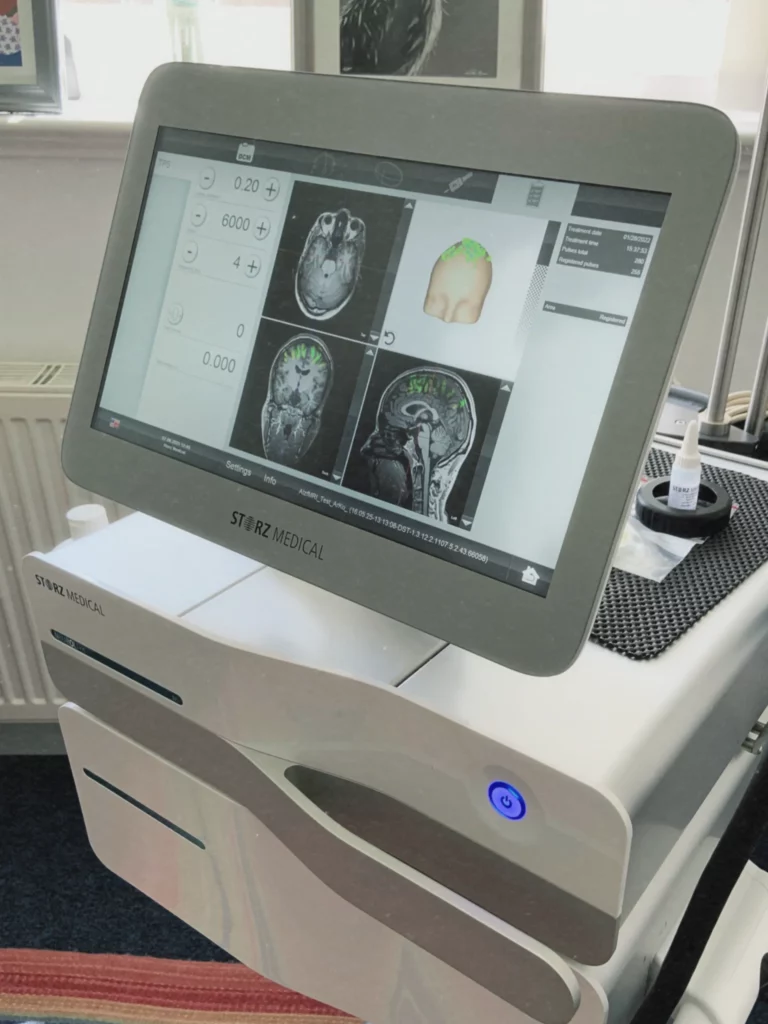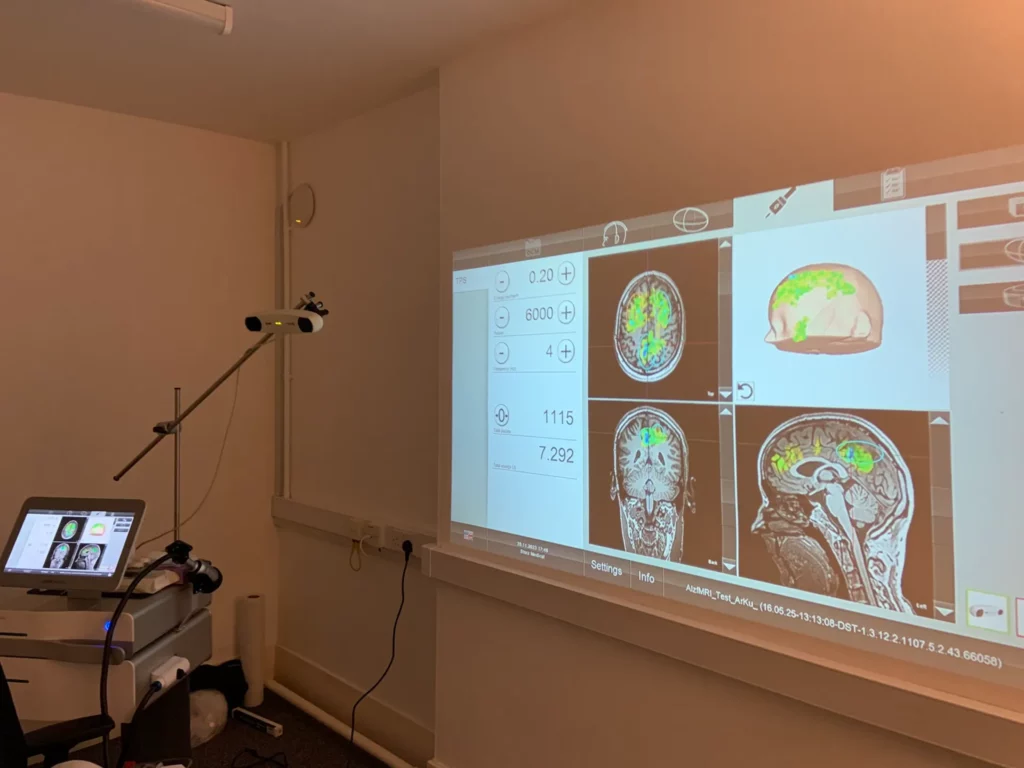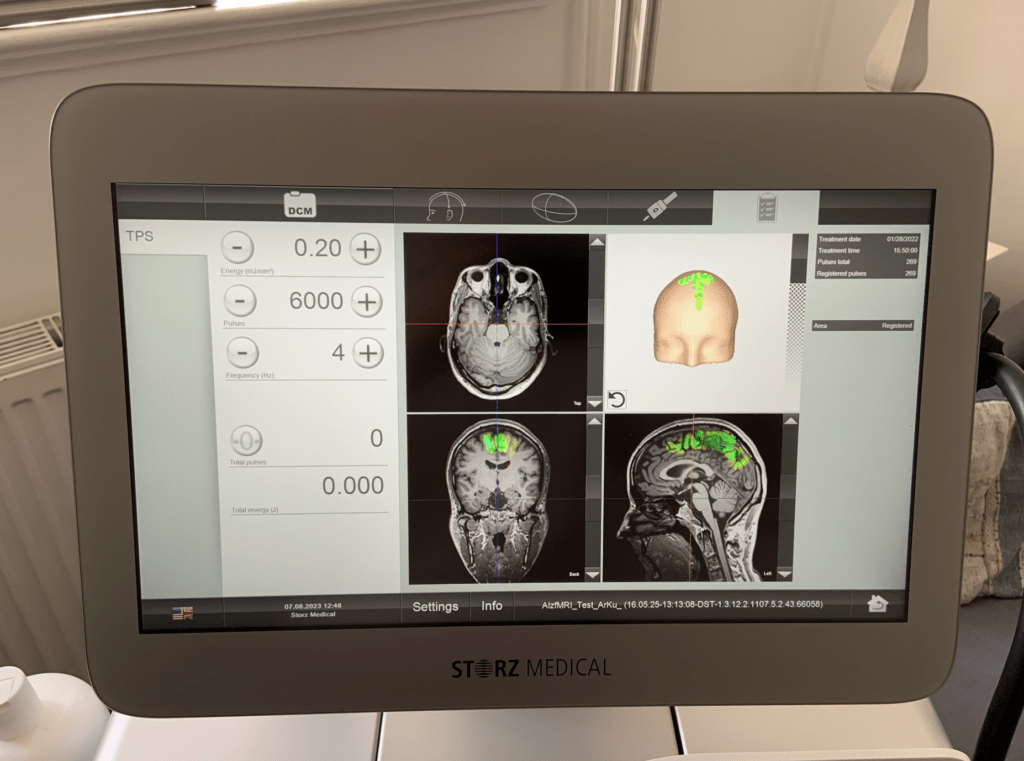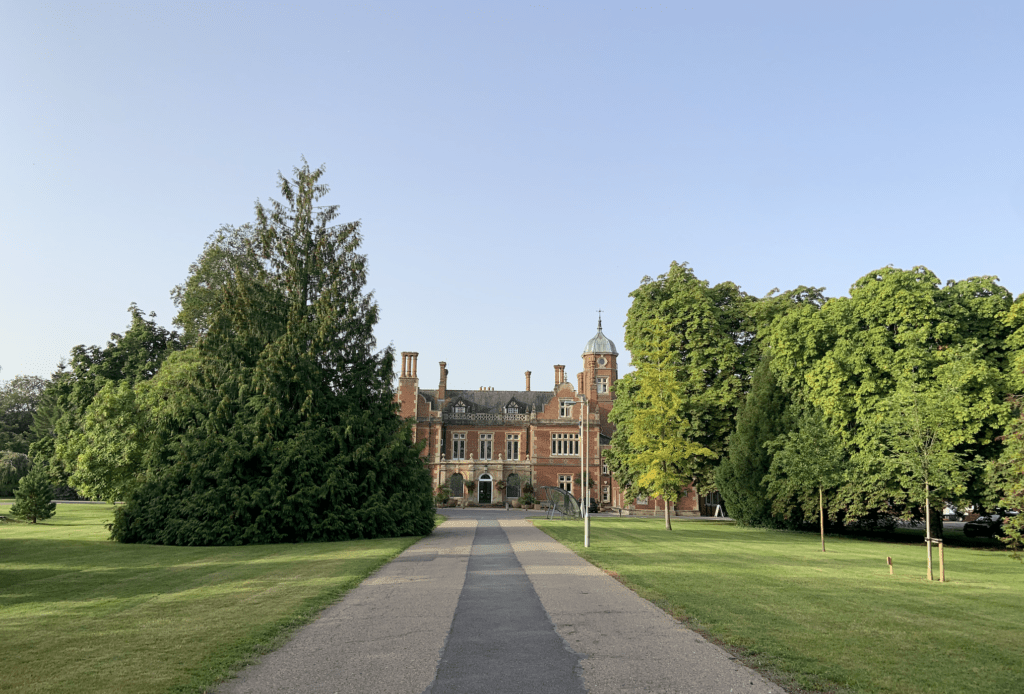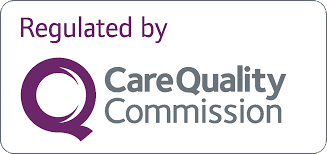The Neurostimulation Lab
We’re experts in cutting edge treatments for neurological and psychiatric conditions.
What is Neurostimulation?
Neuromodulation, also known as non-invasive brain stimulation (NIBS), describes a non-drug approach to treating neurological and psychiatric conditions.
At Neuro Clinics we are experts in transcranial magnetic stimulation (TMS) and transcranial pulse stimulation (TPS) which are methods of neurostimulation.
What is NeuroPulse™ TPS®?
TPS® is an Alzheimer’s intervention which involves passing short acoustic pulses with an ultrasound frequency range through the patient’s head to stimulate deep cerebral regions of the brain with millimeter accuracy.
TPS® induces mechanotransduction, which is when cells convert mechanical stimulus into biochemical signals
To perform the procedure, we use a machine called a Neurolith™, created by Storz Medical, one of Europe’s leading medical machine manufacturers since 1987.
TPS is only for patients who have already taken or considered first line treatments, and our team will discuss the benefits and risks. We recommend that cognitive enhancing drugs are continued during TPS therapy. As a newer treatment, the evidence is relatively preliminary for TPS. Regarding the anti-amyloid therapies, it is possible to combine them with TPS, however, the exact treatment schedule should be decided with your clinician.
What are the biological effects of Transcranial Pulse Stimulation (TPS®)?
Neuromodulation can have a variety of biological effects. At its simplest, it leads to mechanotransduction, where the stimulus is changed by nerve cells into a array of biochemical signals. Current research studies at the University of Zurich are investigating these molecular effects. There is preliminary evidence of the effect of TPS on brain electric networks, available here https://pubmed.ncbi.nlm.nih.gov/39192004/ (Wojtecki et al., 2024).
Is Transcranial Pulse Stimulation (TPS®) Safe?
TPS® has minimal side effects, thanks to the short duration of the TPS® stimulation, heating of the tissue is prevented. TPS® is performed directly through the skull, non-invasively. The patient remains awake during the treatment in a comfortable seated position.
MedHealth Review article / press:
Innovative Alzheimer’s Treatment Now Offered by Dr. Daniel Casey at Oxford TPS Clinic
What are the Advantages of Treatment with TPS®?
- Painless procedure
- Minimal side effects
- Non-invasive
- No medication needed
- No need to shave the hair
- Personalised treatments based on MRI data
- Remain in a comfortable seated position during treatment
Is TPS therapy right for you?
- Works with your existing treatment
- Use with your medications or on its own
- Non-drug and CE certified
- No drug side effects and approved for use as a medical device in 2018 by the EU
- Painless and non-invasive
- Remain in a comfortable seated position during treatment
- Personalised treatments
Treatment Pathway
Cognitive Assessment
One of our team will conduct a thorough review of your health, cognitive function and eligibility.
Fee: £360
2
Brain Scan
You will then be referred for a specialised MRI scan which will give us a snapshot of your current disease state. A radiologist will write a report.
Fee: Approx £350-450 depending on location
3
Follow up call
Your clinician will discuss the results and the radiologist’s report, and prescribe your course of TPS if appropriate.
Fee: included in initial assessment fee.
TPS Sessions Part 1
TPS induction session, consisting of 3 sessions, with a protocol tailored to your MRI scan.
Fee: £2,499
5
TPS Sessions Part 2
If patients are benefiting from the initial induction sessions, and the treatment is well tolerated, then it is recommended to complete 3 further sessions (4 – 6).
Fee: £2,499
Frequently asked questions
What conditions would make me ineligible?
To qualify for TPS®, you will first need a formal medical diagnosis of Alzheimer’s dementia and ideally be in the first year since diagnosis.
These include:
- Vascular dementia
- Mixed dementia
- Lewy Body dementia
Other exclusion criteria include those with:
- Coagulation disorders (haemophilia)
- Anticoagulants: e.g. warfarin, NOACs/DOACs
- Aspirin is a relative contraindication – patients can be treated depending on the clinical situation and a lower TPS dose used
- Thrombosis
- Pregnancy
- Epiphyseal fusions in children
- Tumour in the treatment zone.
- Cortisone therapy within 6 weeks before the first treatment
- Metal objects in head
- Pacemakers that are not authorised for the TPS® therapy.
- MRI results with a high Fazekas score or other contraindication, or reversible cause of memory problems in which case TPS not indicated
What do the primary assessments include?
These assessments are performed in order to evaluate patient health, and are not necessarily eligibility requirements.
- History of memory problems with duration and any investigations already undertaken.
- Past medical history.
- Review of brain imaging
What do the memory problem investigations include?
- Investigations are only required if the patient does not already have a relevant diagnosis established
- MRI brain scan.
- Full blood count and ESR.
- Kidney, liver & bone function.
- Thyroid function.
- Hba1c and lipids.
- Vitamin B12, folate and ferritin.
- Syphilis screen.
- HIV 1&2.
- Urine culture.
- Less frequently, infectious disease screening (syphilis, HIV)
Do I have to have a dementia assessment first or can I book straight in for a neurostimulation / TPS assessment?
If you do not have a diagnosis, then you will need to have a dementia assessment in the first instance – see dementia page. If you have already had an assessment elsewhere, then you can book straight in for a TPS assessment.
All patients will be referred for a brain scan (MRI) to assess the current disease stage, check for eligibility and to tailor the treatment protocol.
Please book a free phone consulation, or fill out our contact form, or chat with our friendly medical secretaries and we can help guide you to the right appointment type.
What kind of person is this for? Alzheimer’s, dementia, or anyone else?
Transcranial Pulse Stimulation (TPS) was designed primarily for individuals with Alzheimer’s, which is a sub-type of dementia.
Clinical Evidence for NeuroPulse™ TPS®
TPS has a CE mark for use as a medical device in the EU, and also is approved for use in many countries worldwide. Over 10,000 patients have been treated globally, mainly for Alzheimer’s dementia but also for Parkinson’s disease and other conditions. See scientific literature list below for papers and links. TPS is intended for use as an adjunct (i.e. in addition to) standard of care.
Real World Evidence
At Neuro Clinics we are committed to providing excellent patient care and enabling access to the latest treatments. Part of this is contributing to the evidence base and publishing our patient outcomes.
At Neuro Clinics UK, we are collecting patient data in a real world evidence project with the University of Reading (UoR) (Dr Eva Feredoes, Neuroscientist) to add to the evidence base. All patients undergoing treatment will be offered to be included.
*Patients choosing TPS treatment will have to be capacitous, and sign a consent form detailing that they understand that it is a novel therapy, and the current strengths and limitations of the clinical evidence base.
References to scientific literature – Neurology
Effect of Transcranial Pulse Stimulation for the Treatment of Alzheimer´s Disease and its Related Symptoms
Ramiro Fernández-Castaño, Miguel Ángel Fernández-Blázquez*, Iria Echevarría Fernández, Manuela Cabrera-Freitag, Karin Freitag
Curr Alzheimer Res. 2023;20(4):244-249. doi: 10.2174/1567205020666230727102025. PMID: 37497687.
Alzheimer’s Pathogenesis and Treatment by Transcranial Pulse Stimulation
Christiyan Naydenov, Teodora Manolova, Ivan Mindov
Open Access Maced J Med Sci [Internet]. 2023 Mar. 26 [cited 2023 Nov. 22];11(F):206-9. doi: 10.3889
Transcranial pulse stimulation in Alzheimer’s disease – A review
Xinxin Chen, Jiuhong You, Hui Ma, Mei Zhou, Cheng Huang
CNS Neurosci Ther. 2023; 00:1-10. doi:10.1111/cns.14372
Retrospective real-world pilot data on transcranial pulse stimulation in mild to severe Alzheimer’s patients
Celine Cont, Nathalie Stute, Anastasia Galli, Christina Schulte, Kazimierz Logmin, Carlos Trenado and Lars Wojtecki
Front. Neurol. (2022) 13:948204. doi: 10.3389/fneur.2022.948204
Functional Specificity of TPS Brain Stimulation Effects in Patients with Alzheimer’s Disease: A Follow-up fMRI Analysis
Gregor Dörl, Eva Matt, Roland Beisteiner
Neurol Ther, 2022 Sep;11(3):1391-1398
Transcranial ultrasound pulse stimulation reduces cortical atrophy in Alzheimer’s patients: A follow-up study
Tudor Popescu, Cyril Pernet, Roland Beisteiner
Alzheimers Dement (N Y). 2021 Feb 25;7(1):e12121.
Transcranial pulse stimulation (TPS) improves depression in AD patients on state-of-the-art treatment
Eva Matt, Gregor Dörl, Roland Beisteiner
Alzheimers Dement (N Y). 2022 Feb 10;8(1):e12245. doi: 10.1002/trc2.12245. eCollection 2022.
First evidence of long-term effects of transcranial pulse stimulation (TPS) on the human brain
Eva Matt, Lisa Kaindl, Saskia Tenk, Anicca Egger, Teodora Kolarova, Nejla Karahasanović, Ahmad Amini, Andreas Arslan, Kardelen Sariçiçek, Alexandra Weber, Roland Beisteiner
J Transl Med. 2022 Jan 15;20(1):26. doi: 10.1186/s12967-021-03222-5.
Treating the brain at the speed of sound
Roland Beisteiner, Andres Lozano
Brain Stimul. Jul-Aug 2020;13(4):1087-1088. doi: 10.1016/j.brs.2020.04.020.
Transcranial Pulse Stimulation With Ultrasound in Alzheimer’s Disease-A New Navigated Focal Brain Therapy.
Roland Beisteiner, Eva Matt, Christina Fan, Heike Baldysiak, Marleen Schönfeld, Tabea Philippi Novak, Ahmad Amini, Tuna Aslan, Raphael Reinecke, Johann Lehrner, Alexandra Weber, Ulrike Reime, Cédric Goldenstedt, Ernst Marlinghaus, Mark Hallett, Henning Lohse-Busch.
Adv Sci (Weinh). 2019 Dec 23;7(3):1902583. doi: 10.1002/advs.201902583. eCollection 2020 Feb.
Low-Intensity Extracorporeal Shock Wave Therapy Enhances Brain-Derived Neurotrophic Factor Expression Through PERK/ATF4 Signaling Pathway.
Bohan Wang, Hongxiu Ning, Amanda B Reed-Maldonado, Jun Zhou, Yajun Ruan, Tie Zhou, Hsun Shuan Wang, Byung Seok Oh, Lia Banie, Guiting Lin, Tom F Lue.
Int J Mol Sci. 2017 Feb 16;18(2):433. doi: 10.3390/ijms18020433
Meet Our Team
Our Clinic
Neuro Clinics aims to bring world class care to patients suffering from neurological and psychiatric disorders. Our UK clinic is located in Oxfordshire, in a historic manor house. The beautiful gardens and site make for a therapeutic environment, where patients can take a walk in the greenery and visit the river Thames. If you are travelling to the clinic from abroad, Heathrow is an hour away, and there are many accommodation options in nearby Oxford. If driving, there is ample free parking, making for stress free visits.
